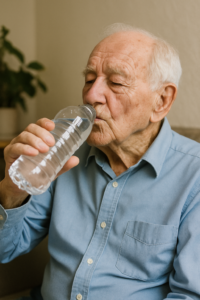Staying Hydrated: A Senior’s Quick Guide

Staying Hydrated: A Senior’s Quick Guide

What is hydration?
It’s having enough fluid for your body to work properly. Water helps with everything from
energy to temperature control.
Why do seniors need extra care?
Our thirst signals can weaken with age, and some medications/conditions increase fluid loss,
making dehydration more likely.
Signs of Dehydration
Watch for thirst, dark urine, less frequent bathroom trips, dry mouth,
headaches, tiredness, dizziness, and confusion. Don’t ignore these!
How to Stay Hydrated
● Sip water regularly throughout the day, don’t wait for thirst.
● Drink at set times (meals, wake-up, bedtime).
● Include other fluids like juice, milk, and watery fruits.
● Drink more in hot weather or when active.
● Pay attention to your body’s signals.
● Discuss fluid needs with your doctor.
● Keep drinks easily accessible.
● Add flavour to water if plain is unappealing.
Staying hydrated is key to good health as we age. Small, consistent sips make a big
difference!
For more information, head to the NHS website for more information Dehydration – NHS

Write a Comment